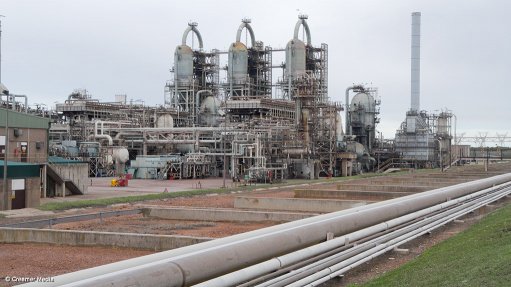
Photo by: Duane Daws
South Africa’s embattled national oil company PetroSA, which recorded a whopping net operating loss of R14.6-billion in 2014/15, insisted on Thursday that it remained a “going concern”, while unveiling a turnaround strategy designed to secure its long-term viability and financial sustainability.
The State-owned group attributed that record loss primarily to a R14.5-billion impairment charge against the company’s operating assets, including an R11.7-billion impairment of the Mossel Bay gas-to-liquids refinery, arising as a result of the nonperformance of a gas-replenishment programme dubbed Project Ikhwezi.
The five-well drilling programme was expected to deliver a 242-billion cubic feet (bcf) gas reserve, but had only delivered 25 bcf from three wells, severely curtailing output at the refinery.
A further R2.8-billion impairment charge was raised as a result of the 21% fall in oil prices during the year, which mainly affected PetroSA’s Jubilee and TEN oilfield assets in Ghana.
PetroSA’s acting group CEO Mapula Modipa expressed unhappiness with the performance, but insisted that the group remained a going concern, highlighting the fact that PetroSA had repaid and refinanced debt of R1.5-billion during the financial year.
The company also generated cash from operations of R3.5-billion, which was better than the R2.2-billion achieved in 2013/14.
TURNAROUND OPTIONS
The PetroSA board and the company’s shareholder, the Central Energy Fund, had approved a process to develop a turnaround strategy. Dubbed Project Apollo, a team comprising industry experts had been given six months to finalise the strategy.
“The team is exploring different options that include, among others, the maximisation of a number of upstream initiatives, the utilisation of tail gas and how the GTL Refinery can be optimised, under the current feedstock-constrained circumstances. The team has been at work for two months and significant progress has already been achieved.”
Central Energy Fund (CEF) interim CEO Siphamandla Mthethwa told Engineering News Online that various technical options were being considered to ensure the continued operation of the refinery, as well as to raise its production prognosis. CEF owns PetroSA, which is the largest asset within a group that also houses the Strategic Fuel Fund and coal miner, African Exploration Mining and Finance Corporation.
The plant, previously known as Mossgas, had a nameplate capacity of 42 000 bbl/d, but was producing at less than half that rate.
In light of the nonperformacne of Project Ikhwezi, which Mthethwa attributed primarily to geological factors, the Apollo team was investigating the possibly of replacing gas with condensate, a light liquid hydrocarbon.
The importation of condensate was considered technically and financially feasible and could also support a possible brownfield expansion of the refinery to around 100 000 bbl/d over the medium term.
The potential for liquefied natural gas (LNG) imports had previously been considered, but the plan was found to be financially and technically unviable. However, Mthethwa stressed that PetroSA was still considering playing a role in the importation of LNG for the nascent gas-to-power market, with sites at Saldanha Bay, Coega or Richards Bay under consideration.
The Apollo team was also mulling over the future configuration of the company, including an upscaling of its upstream activities in the rest of Africa and expanding its trading operations, which were currently driven by diesel sales to power utility Eskom.
Plans for a large-scale crude refinery at Coega and entry into the South African downstream fuel distribution network had been deprioritised in light of PetroSA’s current financial constraints.
Mthethwa reported that the board had also completed its investigation into the performance of various executives, who were placed on “precautionary suspension” earlier in the year. Modipa had been appointed acting CEO in June after Nosizwe Nokwe-Macamo was suspended along with CFO Lindiwe Bakoro.
An ad hoc board committee had been assembled to deal with the recommendations and Mthethwa indicated that it was aiming to resolve the leadership issue before the end of October.